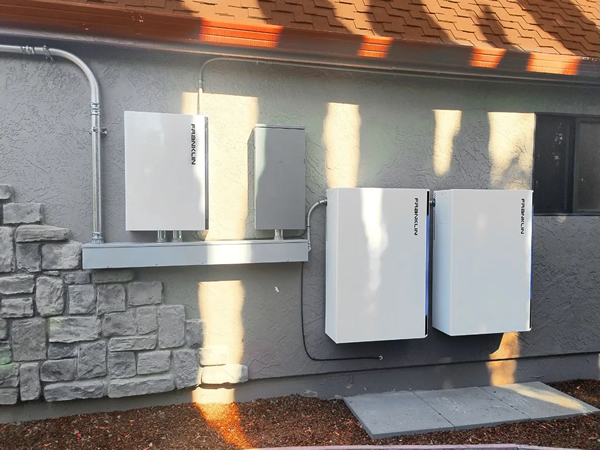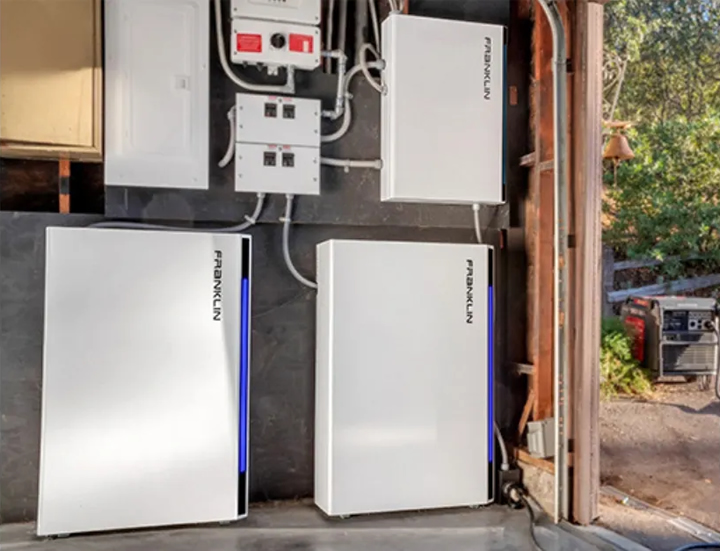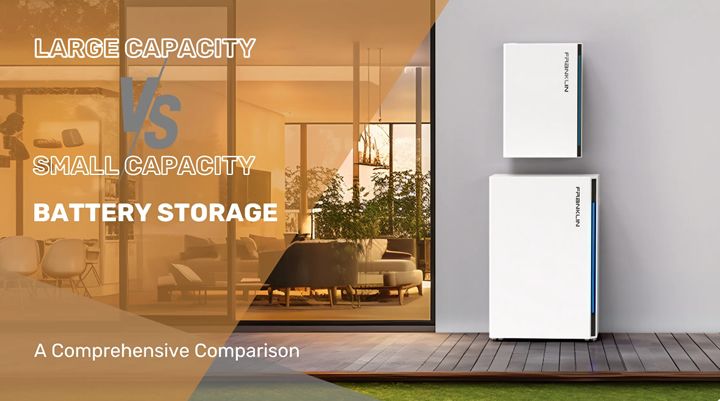Choosing between a large-capacity home battery storage system and a smaller one can be a complex decision, as each option comes with its own set of advantages and drawbacks.
Article from | Franklin Whole Home
Article originally published on Franklin Whole Home blog:
As the demand for renewable energy solutions continues to rise, homeowners are increasingly turning to battery storage systems to enhance their energy independence and efficiency.
Choosing between a large-capacity home battery storage system and a smaller one can be a complex decision, as each option comes with its own set of advantages and drawbacks.
In this article, we explore the pros and cons of home energy management systems with both large and small-capacity battery storage, to help you make an informed decision.
Large Capacity Home Battery Storage
Large-capacity home battery storage often exceeds 20 kWh, allowing homeowners to store significant amounts of electricity for later use. This is ideal for homes with high energy consumption, providing extended backup power during outages and maximizing the utilization of solar energy.
Pros
Greater Capacity
Large Energy Storage: Big battery systems typically offer substantial energy storage capacity, often exceeding 20 kWh. This allows homeowners to store more energy, ensuring a reliable power supply during extended outages.
Scalability: These systems can often be expanded by adding additional storage units, providing flexibility to increase storage as energy needs grow.
Enhanced Backup Power
Extended Backup: With larger storage capacities, big battery systems can power essential household loads for longer periods, making them ideal for areas prone to frequent or prolonged power outages.
Optimized Solar Utilization
Higher Solar ROI: Larger batteries can store more excess solar energy generated during the day, maximizing the return on investment (ROI) for solar panel systems and reducing the reliance on the grid.
Future Proofing
Prepared for Increased Demand: As households adopt more electric appliances and vehicles, having a large battery system ensures you are prepared for future energy demands.

Cons
Higher Initial Cost
Expensive Installation: Large battery systems come with a significant upfront cost, which can be a barrier for many homeowners. Installation and setup can also be more complex and costly.
Space Requirements
Bulky Equipment: These systems require more physical space for installation, which can be a challenge for homes with limited space or those looking to maintain aesthetic appeal.
Potential Overcapacity
Underutilization Risk: If a household’s energy consumption is low, a large battery system might not be fully utilized, leading to inefficiency, and wasted resources.

Small Capacity Home Battery Storage
Small capacity refers to residential systems designed with a storage capacity, ranging from 5 to 10 kWh.
These systems are suitable for homes with modest energy needs or for providing backup power only to essential loads during short outages. They are more affordable and space-efficient compared to larger battery systems.
Pros
Lower Initial Cost
Affordable Option: Small-capacity battery systems are less expensive, making them a more accessible option for homeowners on a budget. They are also less expensive to install and maintain.
Space Efficiency
Compact Size: These systems are smaller and more compact, requiring less space for installation and offering greater flexibility in placement.
Sufficient for Modest Needs
Basic Backup Power: For households with lower energy consumption or those seeking backup for only essential loads, small batteries can provide adequate support during short outages.
Easier Upgrades
Incremental Expansion: Homeowners can start with a small system and add more capacity over time as needed, spreading out the cost and making the upgrade process more manageable.

Cons:
Limited Capacity
Lower Storage: Small battery systems have limited energy storage capacity, typically ranging from 5 to 10 kWh. This can be insufficient for homes with high energy demands or during extended outages.
Shorter Backup Duration
Brief Backup: Due to their smaller capacity, these systems can only provide backup power for shorter durations, which may not be adequate during prolonged grid failures.
Reduced Solar Utilization
Less Solar Storage: Smaller batteries can store less excess solar energy, potentially leading to more reliance on the grid and lower solar ROI.
Frequent Cycling
Increased Wear: Smaller batteries may undergo more frequent charge and discharge cycles, which can reduce their lifespan and efficiency over time.

What size home battery do I need?
When deciding on home battery storage capacity, homeowners should consider several factors to determine which system best meets their needs.
Energy Needs
High Energy Consumption: If your home has high energy usage, particularly with appliances, and electric vehicles, or if you run a home office or workshop, a large-capacity home battery storage system is more suitable.
Low to Moderate Energy Consumption: For homes with lower energy needs or those looking to power only essential appliances during outages, a small-capacity home battery storage system may be sufficient.
Budget
Initial Cost: Large battery systems come with a higher upfront cost. If you have a substantial budget and are looking for a long-term investment, a big system might be the way to go.
Cost-Effective Solution: If budget constraints are significant, a small battery system offers a more affordable entry point into home energy storage.
Backup Power Requirements
Extended Backup: If you live in an area prone to frequent or prolonged power outages, a large battery system can provide extended backup power, keeping your home running longer during grid failures.
Short-Term Backup: For regions with rare outages or where short-term backup is adequate, a small battery system can cover essential loads for brief periods.
Space Availability
Ample Space: Large-capacity home battery systems require more space for installation. If you have ample space available in your garage, basement, or utility area, accommodating a large system should be feasible.
Limited Space: Smaller systems are more compact and can fit into tighter spaces, making them ideal for homes with limited installation areas.
Solar Energy Integration
Maximizing Solar ROI: If you have a large solar panel system and want to maximize your solar energy utilization by storing excess power, a big battery system will help you achieve higher solar ROI.
Basic Solar Storage: For homeowners with smaller solar installations or those looking to store only a portion of their solar energy, a small battery system can still provide meaningful benefits.
Scalability
Future-Proofing: If you anticipate increasing your energy needs in the future, such as adding more electric appliances or vehicles, starting with a big system or one that can be easily expanded is advantageous. Incremental Upgrades: If you prefer to start small and expand over time, small battery systems that offer scalability can grow with your energy demands and financial capacity.
Energy Management Goals
Advanced Energy Management: For homeowners interested in sophisticated energy management, including the ability to manage multiple energy sources and optimize usage, a big system with advanced features is more beneficial.
Basic Energy Management: If your goal is simply to ensure some level of energy security and efficiency, a small battery system can effectively meet your needs.

FranklinWH energy management and storage
FranklinWH energy system includes a large storage battery capacity of 13.6 kWh and can be expanded to 15 units per controller with a complete home energy management system. It can satisfy both the energy management and storage needs of households.
The FranklinWH system contains two primary units: aGate and aPower.
The aGate is the energy management of the system that can integrate solar, grid, battery storage, and generator. It manages multiple energy sources to increase home energy efficiency and solar ROI.
The aPower is an AC-coupled LFP battery with 13.6 kWh storage and can reach a maximum of 204 kWh storage per controller.
With both units, the FranklinWH system is intelligent enough to achieve modern household energy management and provide enough robust backup power to meet different household needs.

Conclusion
Choosing between big and small home battery storage systems depends on your household’s energy needs, budget, and long-term goals.
Large battery systems offer greater capacity, extended backup power, and better solar utilization, making them ideal for homes with high energy demands and frequent power outages. However, they come with higher costs and space requirements.
On the other hand, small battery systems are more affordable, space-efficient, and sufficient for modest energy needs, but they may not provide adequate backup during extended outages and offer limited solar storage.
Carefully assessing your specific energy requirements and financial constraints will help you determine the best battery storage solution for your home, ensuring you achieve optimal energy efficiency and independence.
The content & opinions in this article are the author’s and do not necessarily represent the views of AltEnergyMag
Comments (0)
This post does not have any comments. Be the first to leave a comment below.
Featured Product


